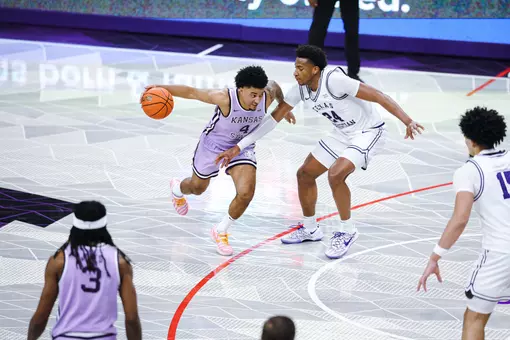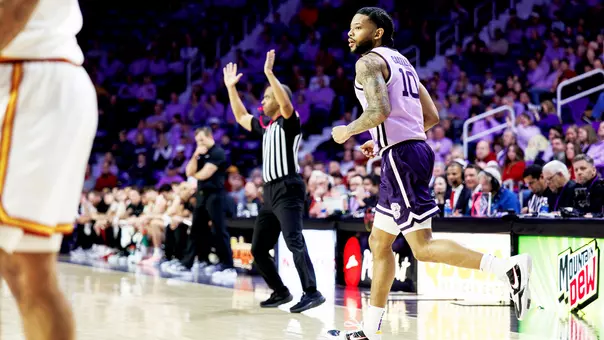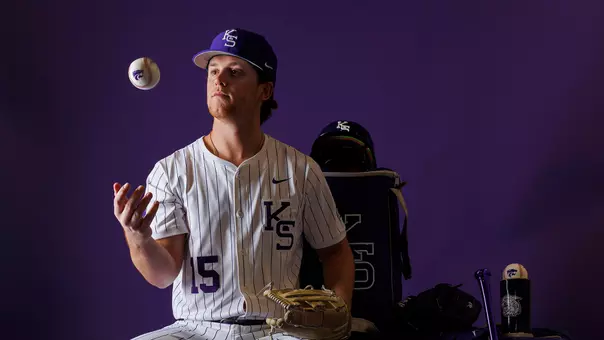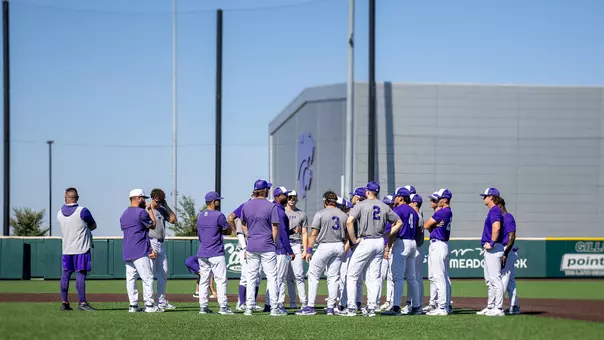
SE: Milwaukee Made — Nearly 40 Years After Leaving, Bruce Weber Carries Hometown's Impact into Saturday's Battle at Marquette
Nov 30, 2018 | Men's Basketball, Sports Extra
By Corbin McGuire
Bruce Weber would be lying if he tried to say K-State's game at Marquette on Saturday at 1:30 p.m., did not mean anything extra, personally. So, he's not even going to try.
"There's no doubt there's some sentimental value to going back," K-State's seventh-year head coach said over the phone on Wednesday morning as he made the drive back to Manhattan from Kansas City, where he flew in from a recruiting trip the night before.
For Weber's 12th-ranked K-State team (6-0), it's a chance to face a prestigious program on the road on national television (FS1).
For him, it's also a homecoming of sorts.
The 62-year-old was born and raised in Milwaukee, Wisconsin. He grew up going to Marquette games, even practices, back when Al McGuire was the school's coach and its mascot was the Warriors. (They are now led by Steve Wojciechowski and are the Golden Eagles.)
The man and coach Weber is now can all be traced back to Milwaukee. Everything from the city's public schools and playgrounds, the many impactful coaches Weber came across and his family played a significant role in jumpstarting his career.
Leaving Milwaukee, however, was not easy. Weber did so in 1979 when he accepted a graduate assistant job at Western Kentucky under Gene Keady.
"I was the first one in my family (to leave). Everyone just stayed in Milwaukee. I'm talking cousins and my aunts and uncles," Weber said, adding that he expected somewhere between 70-100 friends and family at Saturday's game. "Every birthday and Christmas, we were all together. It was just that good, old-fashioned family, and I was the first one to leave.
"I don't know if you want to call me the black sheep," he continued, with a laugh, "but there were a lot of questions about why I was leaving, and I was going for my dream to be a college coach."
Milwaukee Made
Growing up as a sports fan in Wisconsin, especially Milwaukee, in the 1960s and 1970s was intriguing, to say the least.
The Green Bay Packers won three-straight NFL Championships from 1965-67 under Vince Lombardi. In 1966, the Milwaukee Braves and Hank Aaron moved to Atlanta. In 1970, Milwaukee regained baseball with the Brewers.
The Milwaukee Bucks became a franchise in 1968 and landed Lew Alcindor (who changed his name to Kareem Abdul-Jabbar a few years later) with their first pick. The following season they traded for Oscar Robertson and won an NBA title in 1971.
"They actually had buck night where it cost a buck for like eight or 10 games a year, and you would get seats way up at the top," Weber said. "We would get the buck tickets, and then we learned how to sneak down to the bottom."
Marquette basketball, led by McGuire, was also on the rise during Weber's youth. McGuire, a Hall of Fame coach, led Marquette to the Final Four in 1974 and 1977, winning an NCAA title the second time.
Unlike the Bucks in their early years, Weber said Marquette tickets were hard to come by. Each Christmas, however, Weber said he remembers getting tickets for the Milwaukee Classic. He also attended some of McGuire's practices on Friday and Saturday nights early in the season.
"He would practice real late because he wanted to keep his players out of trouble on Friday and Saturday night," Weber said, with a laugh.
Eventually, Weber helped work some of McGuire's camps. This opportunity came through a family connection to Tom Desotell, a Wisconsin Basketball Coaches Hall of Fame member who finished with 646 wins in 39 seasons at the high school ranks.
Weber described Desotell as "the guru of high school basketball." Even more, Desotell was the one that gave Weber an in to be a coach. This started, literally, on the playground.
Back then, Weber said the Milwaukee public school system sponsored organized activities during the summer. Desotell coached one of the playgrounds. Later, Weber's older brother, Ron, took charge of another. Finally, Weber got his chance to coach one. Rick Majerus came up as a coach the same way.
"There were a lot of great memories of competing on the playground and bringing teams in leagues. Now, kids would never play on the playground, but that's how we grew up," Weber said. "I'd go to the playground at nine in the morning and be back at nine at night."
On top of McGuire's camps, Desotell also opened the door for Weber to work those of legendary UCLA head coach John Wooden. Weber said he still vividly remembers getting to take notes for Wooden on early-morning walks.
"I got to walk and listen to Coach Wooden talk for over an hour just about everything," Weber said. "We just had cool experiences to kind of get us intrigued with basketball."
Eventually, Weber volunteered as a coach for Milwaukee Marquette High School. After graduating with a bachelor's degree in education from Wisconsin-Milwaukee in 1978, he even worked one year as a fifth-grade teacher while serving as an assistant coach at Milwaukee Madison High School.
Then, as he prepared to return to graduate school, his lucky break came. Keady, the head coach at Western Kentucky at the time, needed a graduate assistant; his left in August and a replacement was needed sooner than later.
Through his Milwaukee-made connections, Weber managed to get the offer.
"I had a whim, I had a dream… I wanted to be a college coach," Weber, who worked under Keady for 19 years, said. "I always say it's a miracle how it worked out."
Family Formed
Weber was the third of five children. Or, as he put it, he grew up "stuck in the middle."
"I had to fend for myself," he laughed. "I had the two older ones picking on me, and if I picked on the two younger ones then I'd get it back from the two older ones."
His spot in his family's birth order shaped him. He always wanted to beat his older siblings, in everything from pick-up basketball to chess to bottlecap hockey. And he certainly did not want to let either of his younger siblings to better him.
This competitiveness produced a trend for Weber.
"I'm sure my friends would tell you I was a little bit tough and driven. I did everything probably to the ultimate extreme. I went too hard," he said. "I ended up in the hospital a lot. At one point it was like 17 times to the emergency room by age 14. I was a walking disaster, I guess."
Weber's father, Louis, made sure sports were a big part of the family. He coached his children at a younger age and pushed them to become teachers and coaches later in life.
"If you asked my sister (Jan), sports was our life," Weber said. "My dad, he loved it. He thought it was a great avenue for our life."
All of them followed that path — coaching, teaching or both.
His older sister, Jan, became a teacher and got into education administration in the Chicago area. Carrie, his younger sister, was pursuing an education degree before she died in a car accident in 1979. His brothers both coached and taught at the high school level. Dave and Ron are now members of the Illinois and Wisconsin Basketball Coaches Hall of Fames, respectively.
Weber has collected 400-plus wins as a college head coach, including a 131-80 mark at K-State. He's won conference titles at three different schools, most recently in the 2012-13 season, his first at K-State. Last season's NCAA Tournament run made Weber one of only 10 coaches ever to take three programs to the Sweet 16.
None of it would have been possible, Weber said, if not for the example their parents set. His father, who immigrated from Austria as a child, was "hard-nosed and tough." His mother, Dawn, had a generous heart. Both parents stressed the importance of education, of working hard, and helping others along the way.
So, while Weber was the first of his family to leave Milwaukee, a place he's never returned to coach, he's carried its collective impact with him. The connections he made there helped start his career. The family that raised him there gave him a foundation of how to lead a program, in many ways its own family.
"I try to instill the same things and give (our players) dreams and visions about life, about opportunity, about exposure and branching out in your life," Weber said. "The work ethic, obviously, to me is important, that you have to earn everything in life. Then we talk about it all the time, caring about others. One, as a team, we have to care for each other, have great togetherness and help each other. That's going to make you a better team. But also beyond that, in life, being there to help somebody else.
"We always talk about how helping somebody else reach their dreams is going to help you reach your dreams."
Bruce Weber would be lying if he tried to say K-State's game at Marquette on Saturday at 1:30 p.m., did not mean anything extra, personally. So, he's not even going to try.
"There's no doubt there's some sentimental value to going back," K-State's seventh-year head coach said over the phone on Wednesday morning as he made the drive back to Manhattan from Kansas City, where he flew in from a recruiting trip the night before.
For Weber's 12th-ranked K-State team (6-0), it's a chance to face a prestigious program on the road on national television (FS1).
For him, it's also a homecoming of sorts.
The 62-year-old was born and raised in Milwaukee, Wisconsin. He grew up going to Marquette games, even practices, back when Al McGuire was the school's coach and its mascot was the Warriors. (They are now led by Steve Wojciechowski and are the Golden Eagles.)
The man and coach Weber is now can all be traced back to Milwaukee. Everything from the city's public schools and playgrounds, the many impactful coaches Weber came across and his family played a significant role in jumpstarting his career.
Leaving Milwaukee, however, was not easy. Weber did so in 1979 when he accepted a graduate assistant job at Western Kentucky under Gene Keady.
"I was the first one in my family (to leave). Everyone just stayed in Milwaukee. I'm talking cousins and my aunts and uncles," Weber said, adding that he expected somewhere between 70-100 friends and family at Saturday's game. "Every birthday and Christmas, we were all together. It was just that good, old-fashioned family, and I was the first one to leave.
"I don't know if you want to call me the black sheep," he continued, with a laugh, "but there were a lot of questions about why I was leaving, and I was going for my dream to be a college coach."
Milwaukee Made
Growing up as a sports fan in Wisconsin, especially Milwaukee, in the 1960s and 1970s was intriguing, to say the least.
The Green Bay Packers won three-straight NFL Championships from 1965-67 under Vince Lombardi. In 1966, the Milwaukee Braves and Hank Aaron moved to Atlanta. In 1970, Milwaukee regained baseball with the Brewers.
The Milwaukee Bucks became a franchise in 1968 and landed Lew Alcindor (who changed his name to Kareem Abdul-Jabbar a few years later) with their first pick. The following season they traded for Oscar Robertson and won an NBA title in 1971.
"They actually had buck night where it cost a buck for like eight or 10 games a year, and you would get seats way up at the top," Weber said. "We would get the buck tickets, and then we learned how to sneak down to the bottom."
Marquette basketball, led by McGuire, was also on the rise during Weber's youth. McGuire, a Hall of Fame coach, led Marquette to the Final Four in 1974 and 1977, winning an NCAA title the second time.
Unlike the Bucks in their early years, Weber said Marquette tickets were hard to come by. Each Christmas, however, Weber said he remembers getting tickets for the Milwaukee Classic. He also attended some of McGuire's practices on Friday and Saturday nights early in the season.
"He would practice real late because he wanted to keep his players out of trouble on Friday and Saturday night," Weber said, with a laugh.
Eventually, Weber helped work some of McGuire's camps. This opportunity came through a family connection to Tom Desotell, a Wisconsin Basketball Coaches Hall of Fame member who finished with 646 wins in 39 seasons at the high school ranks.
Weber described Desotell as "the guru of high school basketball." Even more, Desotell was the one that gave Weber an in to be a coach. This started, literally, on the playground.
Back then, Weber said the Milwaukee public school system sponsored organized activities during the summer. Desotell coached one of the playgrounds. Later, Weber's older brother, Ron, took charge of another. Finally, Weber got his chance to coach one. Rick Majerus came up as a coach the same way.
"There were a lot of great memories of competing on the playground and bringing teams in leagues. Now, kids would never play on the playground, but that's how we grew up," Weber said. "I'd go to the playground at nine in the morning and be back at nine at night."
On top of McGuire's camps, Desotell also opened the door for Weber to work those of legendary UCLA head coach John Wooden. Weber said he still vividly remembers getting to take notes for Wooden on early-morning walks.
"I got to walk and listen to Coach Wooden talk for over an hour just about everything," Weber said. "We just had cool experiences to kind of get us intrigued with basketball."
Eventually, Weber volunteered as a coach for Milwaukee Marquette High School. After graduating with a bachelor's degree in education from Wisconsin-Milwaukee in 1978, he even worked one year as a fifth-grade teacher while serving as an assistant coach at Milwaukee Madison High School.
Then, as he prepared to return to graduate school, his lucky break came. Keady, the head coach at Western Kentucky at the time, needed a graduate assistant; his left in August and a replacement was needed sooner than later.
Through his Milwaukee-made connections, Weber managed to get the offer.
"I had a whim, I had a dream… I wanted to be a college coach," Weber, who worked under Keady for 19 years, said. "I always say it's a miracle how it worked out."
Family Formed
Weber was the third of five children. Or, as he put it, he grew up "stuck in the middle."
"I had to fend for myself," he laughed. "I had the two older ones picking on me, and if I picked on the two younger ones then I'd get it back from the two older ones."
His spot in his family's birth order shaped him. He always wanted to beat his older siblings, in everything from pick-up basketball to chess to bottlecap hockey. And he certainly did not want to let either of his younger siblings to better him.
This competitiveness produced a trend for Weber.
"I'm sure my friends would tell you I was a little bit tough and driven. I did everything probably to the ultimate extreme. I went too hard," he said. "I ended up in the hospital a lot. At one point it was like 17 times to the emergency room by age 14. I was a walking disaster, I guess."
Weber's father, Louis, made sure sports were a big part of the family. He coached his children at a younger age and pushed them to become teachers and coaches later in life.
"If you asked my sister (Jan), sports was our life," Weber said. "My dad, he loved it. He thought it was a great avenue for our life."
All of them followed that path — coaching, teaching or both.
His older sister, Jan, became a teacher and got into education administration in the Chicago area. Carrie, his younger sister, was pursuing an education degree before she died in a car accident in 1979. His brothers both coached and taught at the high school level. Dave and Ron are now members of the Illinois and Wisconsin Basketball Coaches Hall of Fames, respectively.
Weber has collected 400-plus wins as a college head coach, including a 131-80 mark at K-State. He's won conference titles at three different schools, most recently in the 2012-13 season, his first at K-State. Last season's NCAA Tournament run made Weber one of only 10 coaches ever to take three programs to the Sweet 16.
None of it would have been possible, Weber said, if not for the example their parents set. His father, who immigrated from Austria as a child, was "hard-nosed and tough." His mother, Dawn, had a generous heart. Both parents stressed the importance of education, of working hard, and helping others along the way.
So, while Weber was the first of his family to leave Milwaukee, a place he's never returned to coach, he's carried its collective impact with him. The connections he made there helped start his career. The family that raised him there gave him a foundation of how to lead a program, in many ways its own family.
"I try to instill the same things and give (our players) dreams and visions about life, about opportunity, about exposure and branching out in your life," Weber said. "The work ethic, obviously, to me is important, that you have to earn everything in life. Then we talk about it all the time, caring about others. One, as a team, we have to care for each other, have great togetherness and help each other. That's going to make you a better team. But also beyond that, in life, being there to help somebody else.
"We always talk about how helping somebody else reach their dreams is going to help you reach your dreams."
K-State Men's Basketball | Postgame Press Conference at TCU
Saturday, February 07
K-State Men's Basketball | Honoring Coach Jack Hartman
Wednesday, February 04
K-State Men's Basketball | Game Replay vs Iowa State - February 1st, 2026
Monday, February 02
K-State Men's Basketball | David Castillo, PJ Haggerty Postgame Press Conference (Iowa State)
Sunday, February 01






